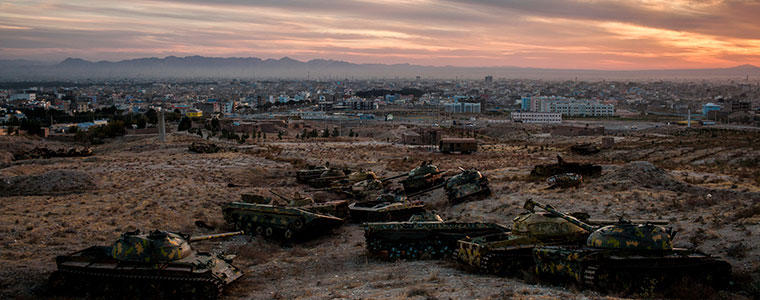Each day, the daily commute to USIP's office in the Wazir Akbar Khan neighborhood of Kabul is punctuated with an unseemly five-minute passage through one of the most horrible sections of the city.

It is not rampant poverty or the scars from the nation's four generations of war that mar the landscape. Instead it is the opulence and saccharine palaces built by some of Afghanistan's most notorious warlords, narco-traffickers, and political elite that rise from the frozen streets like twisted gingerbread houses that taint the city. Their presence is a constant reminder of the systemic abuse of power, the inequity of the justice system and endemic corruption that has forged itself into so many areas of the nation since the Taliban's fall in 2001.
Twelve years ago, the Sher Pur area of Kabul was home to tangled blocks of single-story mud homes. These houses had been passed down over generations, often through systems of unregistered and informal titling.
In a nation that has been marked by decades of regime changes, the system of land titling and records of ownership are notoriously convoluted or missing. In 2004, some of the country's most powerful families and political operatives recognized the expanding value of urban land and they began a systemic campaign to force families from their land and take it as their own. In many instances their actions were considered legal, as all land not formally registered or titled is considered government property – convenient for the government since nearly 75% of all land in Afghanistan is without official title.
Today, Sher Pur is home to some of the most gaudy, poorly-designed homes in all of Kabul. Like most things in town, the styles have been imported from Pakistan and various Gulf states. They are designs meant to be cool during the hot summers of South Asia and the Middle East, but are not built to retain heat well in the high altitude winters of Kabul.
Form over function is their trademark. These homes offer a daily reminder of how a few powerful families and individuals have thrived since 2001, using donor aid, military interventions and perpetually weak governance to their own advantage and to the detriment of Afghanistan's poorest and most vulnerable. It is a reminder not only to those of us who commute past each day, but to all those who live in Kabul who have born witness to the inequitable growth of a few politically connected families.
Many of those families have ties to former warlords and war criminals who have been allies of NATO forces since 2001. The new bourgeoisie of Afghanistan use their influence within the government to quasi-legally grab land and further entrench their wealth. This happens not just in Sher Pur, but in other sections of the city and throughout the country.
The international community's support for these leaders and the government system they control is repeatedly cited by the Afghan public as evidence of the international community's self-interest and indifference to the Afghan people. Whether or not this is true is irrelevant because the perception is real. Partnerships and strategies that were first born of political expediency over a decade ago have led to the long-term de-legitimacy of the state and the international community's efforts in Afghanistan in the eyes of the general citizenry. The state has come to be seen as serving its own interests, protecting the benefits and windfalls that have been captured by a small elite, at the sacrifice of the genuine protection and support for the rest of the Afghan populace.
Sadly, the daily trip past the houses of Sher Pur, dripping with their external refinement and plastered in a veneer of legitimacy, belies the foundation upon which they have been built. Beside the new mansions, you can see the shattered remains of previous homes, the broken hopes of many Afghans for a government that puts the needs of the people above its own greed.



